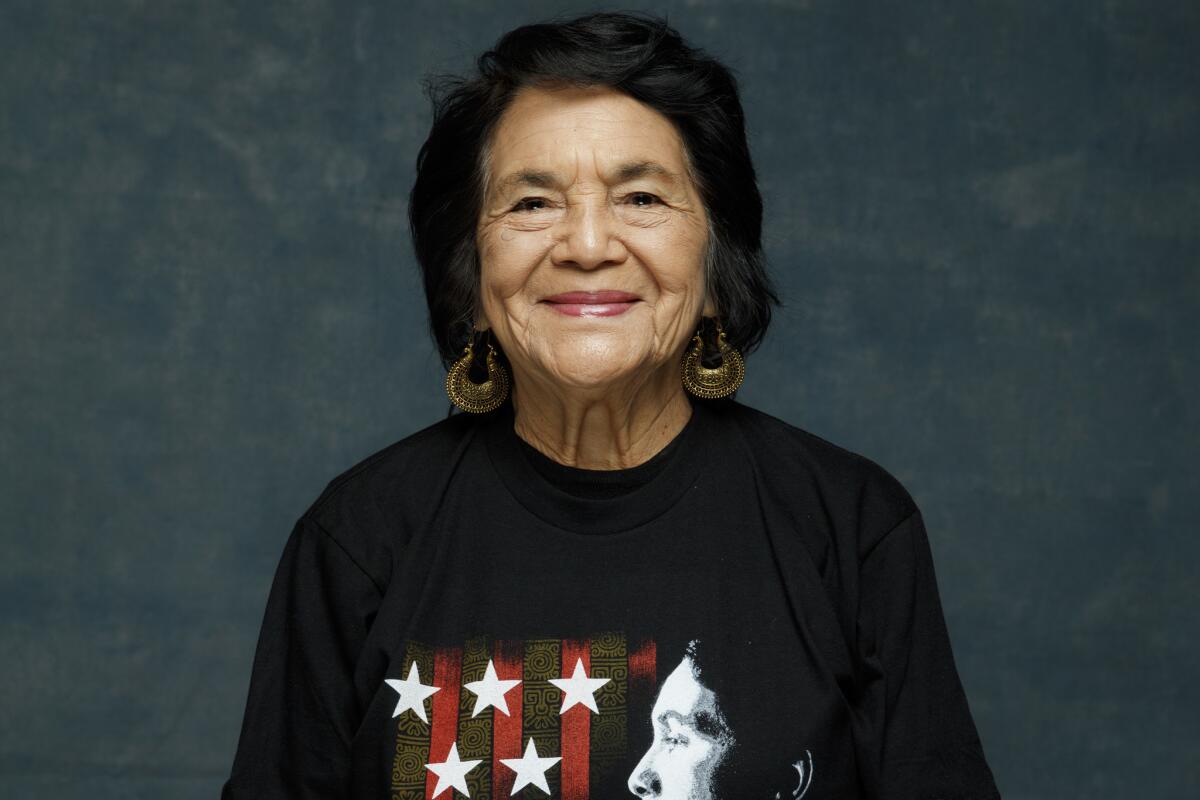Review: Dolores Huerta has been jailed, beaten, mocked by Glenn Beck. A new doc shows why she won’t shut up
“Dolores” is a documentary that celebrates a hero, but it’s no hagiography. Its subject wouldn’t stand for that.
That would be Dolores Huerta, a legendary activist who at age 87 defines indefatigable, a woman whose experience shows what a life of total commitment means — as well as the price it demands.
Huerta has been jailed, seriously beaten, mocked by commentator Glenn Beck and given the Presidential Medal of Freedom by President Obama. Yet she doesn’t have the name recognition of her close collaborator, Cesar Chavez, something director Peter Bratt is determined to change with this vivid, informative and heartening documentary.
Huerta was the co-founder, along with Chavez, of the United Farm Workers union. She’s also the person who came up with that organization’s celebrated slogan, “Si, se puede” — yes, we can — someone whose tireless activism has extended to feminism, the environment and the political process.
Although numerous on-camera voices are complimentary, including Gloria Steinem, Angela Davis and playwright Luis Valdez, the film’s tone is set not by them but by Huerta herself. She’s a clear-eyed and tough-minded truth-teller who has no hesitation about recalling her life exactly the way it was.

You can’t make change unless you’re willing to give something up.
— Dolores Huerta
In addition to being an iconic political organizer, Huerta is also the mother of 11, and what makes “Dolores” unusual is how much screen time it gives to her children as they talk with heartfelt and moving candor about the difficulties of having a parent who, as one of them says, “really didn’t belong to us.”
Outraged at injustice even as a teenager, Huerta met Fred Ross, a legendary community organizer, and by the age of 25 was the political director of his Community Service Organization.
Ross introduced her to Cesar Chavez, and though he was initially wary about her, they jointly formed what became the United Farm Workers because “unless you and I do it, it will never happen.”
Working in backbreaking conditions for wages as low as 90 cents an hour, the Central Valley’s farmworkers certainly needed a union, but organizing them was a challenge because they were poor, often did not speak English and were not citizens.
Huerta, however, did not hesitate. “It was such a calling, I felt it so strongly,” she says, adding with potent simplicity, “this is the reason I live.”
The farmworkers struck in 1965, and Huerta’s example, her organizational skill and her sheer force of belief were key factors in the struggle and had the additional benefit of encouraging women to join the union.
One of the farmworkers’ first high-profile allies was then presidential candidate Robert F. Kennedy. Huerta was one of the people with him the night he was assassinated.
“Dolores” has extremely moving footage of that event and also underlines Huerta’s key role as a union strategist in planning and executing a key farmworker march on Sacramento and a nationwide boycott that saw an estimated 17 million people stop eating grapes.
As impressive as all this is, “Dolores” never lets us forget the human cost that had to be paid, letting Huerta’s children and the woman herself comment frequently on the impact her actions had on her family.
“She was off and running” — that’s one daughter’s rueful comment about one of her mother’s departures. A son reveals that it took her 10 months to realize he’d dropped out of high school. “The movement became her most important child,” another daughter says, adding, “there are scars there because of that.”
“Dolores” also deals with even darker periods in Huerta’s life, providing video of a life-threatening beating by the San Francisco police. Three of her ribs were broken and it took her months to recover.
Painful in a different way was the aftermath of the death of Chavez, when she was unaccountably passed over for the leadership of the union she had helped to found.
The unexpected thing about “Dolores,” finally, is that if its political story makes it important, its human story makes it involving.
“You can’t make change,” Huerta says, “unless you’re willing to give something up,” and this fine documentary shows the truth of that from both sides of the coin.
------------
“Dolores”
No rating
Running time: 1 hour, 37 minutes
Playing: Landmark’s Nuart, West Los Angeles.
See the most-read stories in Entertainment this hour »
Movie Trailers
ALSO
More to Read
Only good movies
Get the Indie Focus newsletter, Mark Olsen's weekly guide to the world of cinema.
You may occasionally receive promotional content from the Los Angeles Times.







